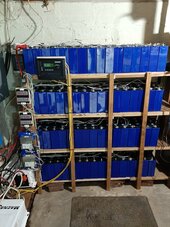Hedges
I See Electromagnetic Fields!
- Joined
- Mar 28, 2020
- Messages
- 20,976
The fuse picture i posted was just an answer to the "what is a meltfuse" question.
The exact fuse was a mega 48v, 300 A.
Right - my search by name pulled up wrong data.
Using part number I get:
"
SPECIFICATIONS
- 70VDC voltage rating
- 2500A at 70VDC interrupting rating
- 14 variants of 60A to 500A current ratings
The issue here is that 2500A isn't high enough AIC rating for LiFePO4 battery. Even an automotive starting battery puts out 3000A into a short circuit, and 100 Ah AGM puts out 4000A.
We haven't seen a good measured value for LiFePO4, but I think it is 10,000 to 20,000A.
Name brand equipment with lithium inside has something like Class T or better, for instance a 150V 67Ah LG battery I've got (30A max draw)
Also some clarification on timing: it happened at 4 at night. A time when the system is at its lowest activity point.
Strange. Look for signs of a short somewhere (although fire melting insulation could cause a short.)
If battery shorted internally and was backfed, might or might not exceed fuse rating but I wouldn't expect thousands of amps.
Another guy had a LiFePO4 fire at night, multiple strings in parallel. But that appeared to overheat at a battery terminal, not a blown fuse, not a high current event.




